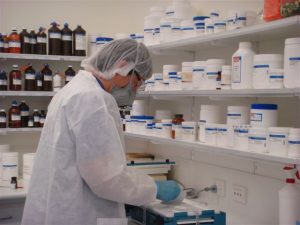 You may already be taking 4-Aminopyridine in the past, the good news is that high dose biotin has been utilized in both progressive and relapsing remitting MS. It works on the nervous system as a cofactor of four essential carboxylases which support myelin repair and prevent axonal degeneration by enhancing energy production in the neurons. Some reports have recorded clinical improvements in more than 90% of cases.
You may already be taking 4-Aminopyridine in the past, the good news is that high dose biotin has been utilized in both progressive and relapsing remitting MS. It works on the nervous system as a cofactor of four essential carboxylases which support myelin repair and prevent axonal degeneration by enhancing energy production in the neurons. Some reports have recorded clinical improvements in more than 90% of cases.
As many of you will know, the Ectrims MS Paris 2017 conference has just concluded. The conference was attended by over 10,000 delegates from around the world (including a few from WA too!). There were numerous papers presented on Biotin during the conference with some positive results. A few of the presented findings that will be special interest to our 4-aminopyridine patients, include:
- Biotin has greater beneficial effects with those already taking Fampridine/4-Aminopyridine.
- Biotin appears to reduce the mitochondrial dysfunction and oxidative stress associated with lipid peroxidation in MS.
- Biotin significantly improves MS-related disability as well as decreasing the risk of progression in patients with progressive MS. Patients with existing treatment with fampridine/4-aminopyridine benefited from biotin in terms of decreased risk of progression and clinical global impressions.
- All subgroups of MS seem to benefit from Biotin when reviewing the EDSS including primary progressive, secondary progressive as well as those using fampridine, or even physical therapy.
- A 36-month study on Biotin use indicated that effects were sustainable over time and disease progression halts when a patient switched from placebo to biotin. Furthermore, because the biotin is so well tolerated it might represent a new class of long-term disease-modifying therapy.
- A large trial (>5000 people) has demonstrated that patients not only had an improved impression score but also their walking distance improved when taking biotin.
These reports are very exciting and there is plenty of information on the MS Paris 2017 website that may be of interest to you. If you have any questions about biotin or the conference findings, please contact me or any of the staff at the Captain Stirling Pharmacy. It would be greatly appreciated if you could let us know your email address so that we can make future contact timely and efficient for you. However, we do ask we would love to know how it affects you after a few months so that we can feed this information back to our MS community. We now offer free freight to our MS patients in the hope it makes it easier to access products like Biotin, Fampridine and Vitamin D3, especially for those that do not visit Nedlands regularly.
Please discuss biotin and all your complementary medicine use with your prescribing neurologist. They will know your specific situation better than anyone else and we are happy to talk directly with them if it assists you.
[1] Biotin in Multiple Sclerosis in clinical practice: a cohort of 154 patients, ECTRIMS Online Library. Fromont A. Oct 25, 2017; 199804
[1] Attenuation of 7-ketocholesterol and 7β-hydroxycholesterol – induced lipotoxicity by dimethylfumarate, monomethylfumarate and biotin on 158N murine oligodendrocytes
ECTRIMS Online Library. Lizard G. Oct 25, 2017; 199696
[1] MD1003 (high doses of biotin) in progressive multiple sclerosis: subgroup analyses of the MS-SPI trial, A. Tourbah , C. Lebrun-Frenay , G. Edan , M. Clanet , C. Papex , S. Vukusic , J. De Sèze , M. Debouverie , O. Gout , P. Clavelou , G. Defer , D. Laplaud , T. Moreau , P. Labauge , B. Brochet , F. Sedel , J. Pelletier (Abstract release date: Oct 7, 2015) ECTRIMS Online Library. Tourbah A. Oct 10, 2015; 116698
[1] Effect of MD1003 (High-Dose Biotin) in Spinal Progressive Multiple Sclerosis (MS-SPI): Subgroup Analyses ECTRIMS Online Library. Tourbah A. Oct 26, 2017; 200442
[1] Effect of MD1003 (High-Dose Biotin) for the Treatment of Progressive MS: 36-Month Follow-Up Data
ECTRIMS Online Library. Tourbah A. Oct 26, 2017; 20044
[1] MD1003 (High-Dose Biotin) for the Treatment of Progressive Multiple Sclerosis: Baseline Data and Results from a Cohort of Patients included in a Early Access Program
ECTRIMS Online Library. Brassat D. Oct 25, 2017; 199796
